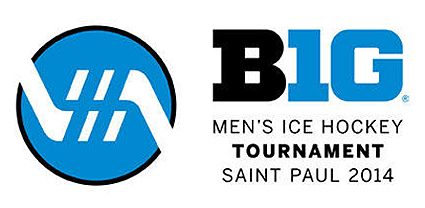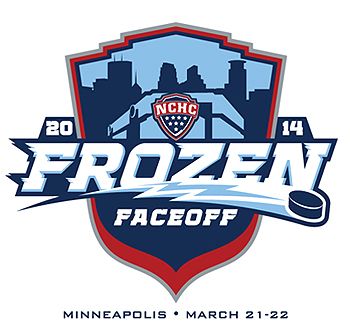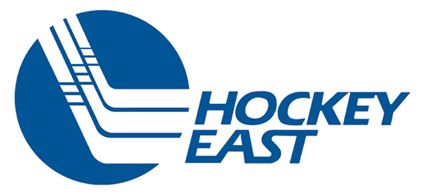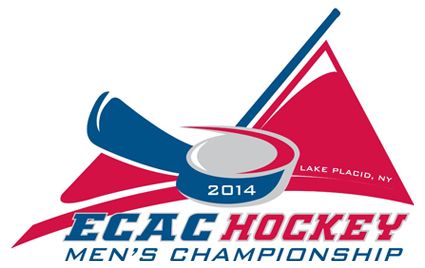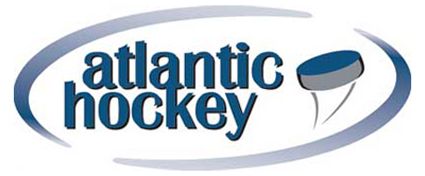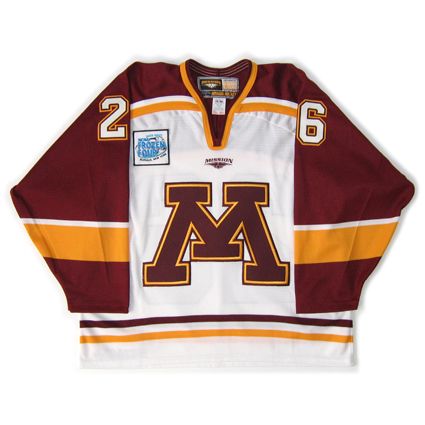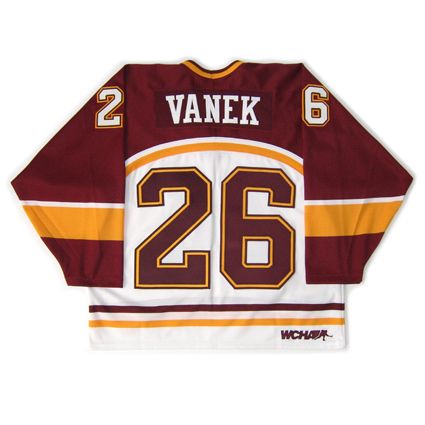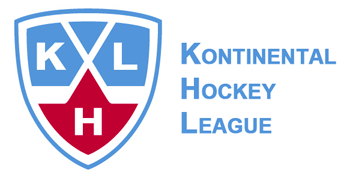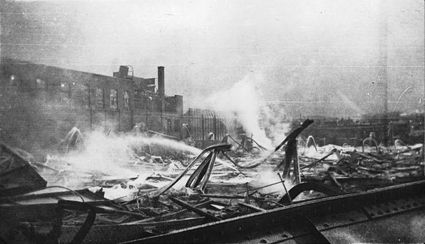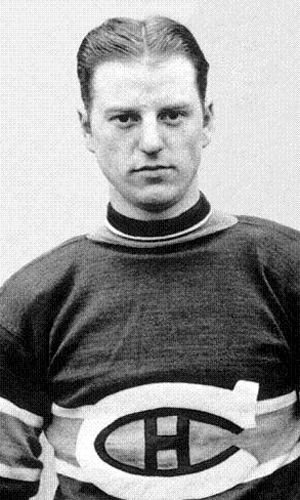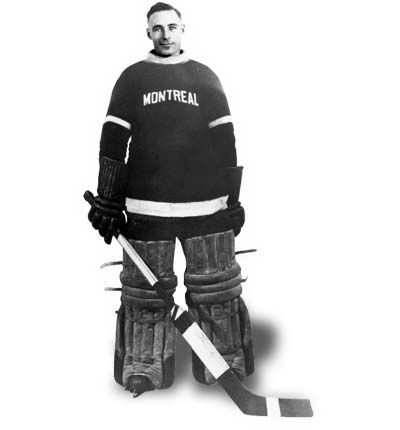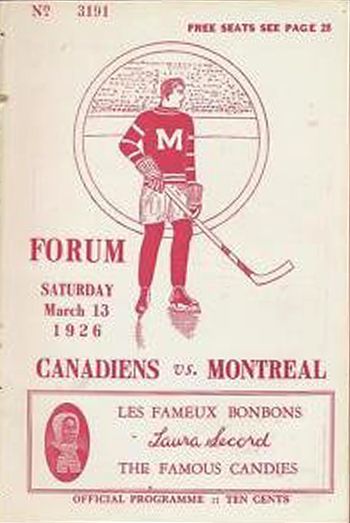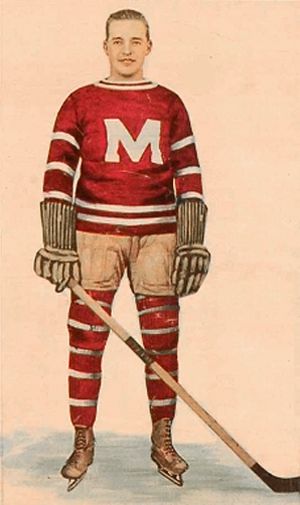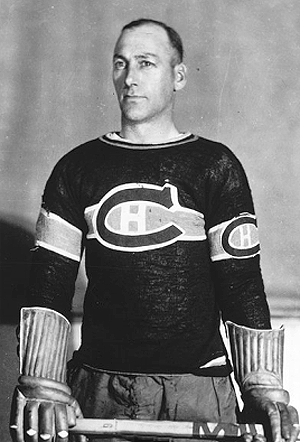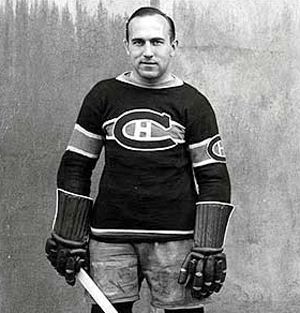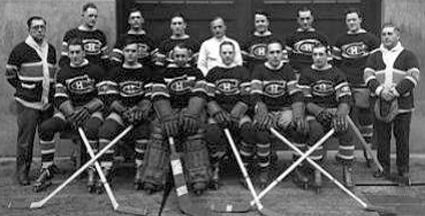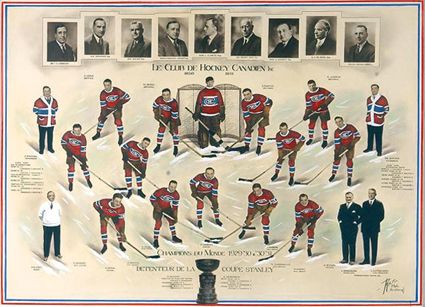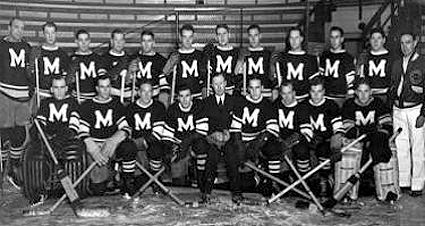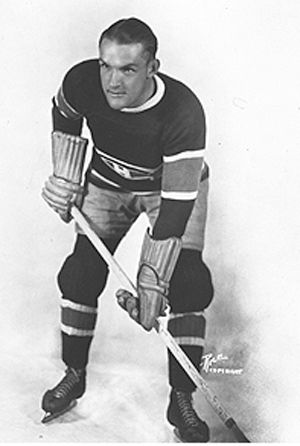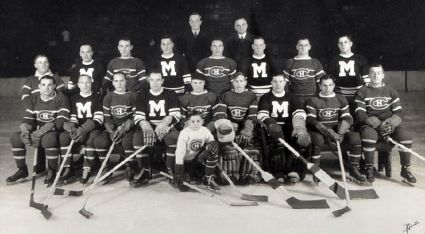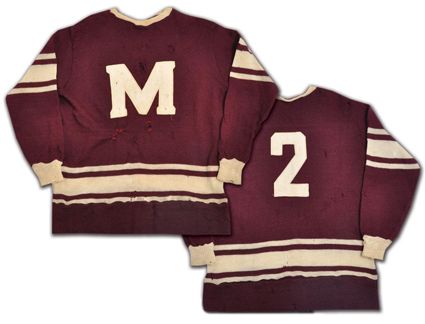Saturday, March 22, 2014
2014 NCAA Conference Tournament Update
To follow up on yesterday's preview of the 2014 NCCA Conference Tournaments, it was a day full of upsets all across the college hockey landscape. (All ranking numbers are within a team's own conference unless noted)
First, in Atlantic Hockey, #1 Mercyhurst (21-13-7) had their season come to an end in a dramatic 5-4 loss in double overtime to #7 Canisius. #5 Robert Morris advanced to face Canisius with their own 5-4 overtime win over #6 Niagara. With the regular season conference championship not being guaranteed a spot in the NCAA tournament, Merchyhurst's #32 raking in the PairWise Rankings won't be nearly enough to get them into the 16 team NCAA field.
The winner of this evening's Canisius (#48 PairWise) vs. Robert Morris (#47 PairWise) game will receive the automatic berth in the NCAA tournament and will likely have to travel to St. Paul, Minnesota for a date with the #1 rated Minnesota Gophers.
Speaking of the Golden Gophers, they lost to #4 Ohio State 3-1 in the Big Ten tournament. The Buckeyes will now face #2 Wisconsin, who outlasted feisty Penn State 2-1. Teams on the bubble PairWise, will be hoping for a Badgers win, as their #4 PairWise ranking assures them a spot in the NCAA's, but a win by Ohio State (#19 PairWise), will cost someone in the top 16 a spot in the national tournament.
The ECAC went according to plan, with #2 Colgate defeating #3 Quinnipiac 3-2 in overtime and #1 Union advancing with a 5-2 defeat of #4 Cornell. The loss by Cornell was especially damaging, as they fell from #15 in the PairWise to #17 by the end of the day, leaving them on the outside looking in. With their win, Colgate rose from #14 to #12, which should be enough to solidify their spot in the national tournament even if they lose today to Union, who at #3 is a lock for the NCAA's.
In Hockey East, #3 Providence lost to #4 New Hampshire, who had the misfortune of actually dropping a place in the PairWise from #17 to #18 thanks to other results, leaving them in a must-win situation in tonight's championship game against #2 UMass Lowell (#7 PairWise), who had an easy time of it with a 4-0 shutout against #7 Notre Dame.
The NCHC is in turmoil, as last place #8 Miami shutout a frustrated #2 North Dakota 3-0 and #6 Denver knocked off #5 Western Michigan 4-3. The loss for North Dakota was especially damaging, as they fell from #11 PairWise to #15 - a position which may very well leave them out of the NCAA's when the automatic bids are given to the conference champions rated outside the top 16 in the PairWise. The winner of the Miami (#29 PairWise) and Denver (#23 PairWise) will claim one of those automatic bids when they play tonight in Minneapolis.
Teams on the NCAA bubble were happy to see the results from the WCHA "Final Five" in Grand Rapids, where the top seeds won, with #2 Minnesota State winning 4-0 against #4 Bowling Green and #1 Ferris State surviving a scare in overtime 5-4 over #6 Alaska Anchorage. With both Ferris State (#4 PairWise) and Minnesota State (#11 PairWise) solidly in the NCAA tournament, the winner will earn conference bragging rights without costing anyone a place in the national tournament.
Games to watch tonight begin with New Hampshire vs. UMass Lowell in Hockey East, as a win by New Hampshire will be bad for teams such as #13 Vermont and #14 Michigan, losers Thursday to Penn State.
Others to choose from with NCAA ramifications include the title games for both Atlantic Hockey and the NCHA. With automatic bids assured to the winners of Atlantic Hockey, #47 PairWise Robert Morris vs. #48 PairWise Canisius, and the NCHC, #23 PairWise Denver vs. #29 PairWise Miami, #15 North Dakota and #16 Northeastern will be out of the NCAA tournament if their rankings remain the same after today, although North Dakota has a chance to improve their standing with a game this afternoon against Western Michigan, as the NCHC is the only one of the six conferences to have a third place game, while Northeastern can only sit by and watch.
Additionally, with other spots potentially going to #19 Ohio State in the Big Ten and #18 New Hampshire in Hockey East, even #13 Vermont and #14 Michigan might find their places going to those with automatic bids, joining yesterday's big loser Mercyhurst on the sidelines.
First, in Atlantic Hockey, #1 Mercyhurst (21-13-7) had their season come to an end in a dramatic 5-4 loss in double overtime to #7 Canisius. #5 Robert Morris advanced to face Canisius with their own 5-4 overtime win over #6 Niagara. With the regular season conference championship not being guaranteed a spot in the NCAA tournament, Merchyhurst's #32 raking in the PairWise Rankings won't be nearly enough to get them into the 16 team NCAA field.
The winner of this evening's Canisius (#48 PairWise) vs. Robert Morris (#47 PairWise) game will receive the automatic berth in the NCAA tournament and will likely have to travel to St. Paul, Minnesota for a date with the #1 rated Minnesota Gophers.
Speaking of the Golden Gophers, they lost to #4 Ohio State 3-1 in the Big Ten tournament. The Buckeyes will now face #2 Wisconsin, who outlasted feisty Penn State 2-1. Teams on the bubble PairWise, will be hoping for a Badgers win, as their #4 PairWise ranking assures them a spot in the NCAA's, but a win by Ohio State (#19 PairWise), will cost someone in the top 16 a spot in the national tournament.
The ECAC went according to plan, with #2 Colgate defeating #3 Quinnipiac 3-2 in overtime and #1 Union advancing with a 5-2 defeat of #4 Cornell. The loss by Cornell was especially damaging, as they fell from #15 in the PairWise to #17 by the end of the day, leaving them on the outside looking in. With their win, Colgate rose from #14 to #12, which should be enough to solidify their spot in the national tournament even if they lose today to Union, who at #3 is a lock for the NCAA's.
In Hockey East, #3 Providence lost to #4 New Hampshire, who had the misfortune of actually dropping a place in the PairWise from #17 to #18 thanks to other results, leaving them in a must-win situation in tonight's championship game against #2 UMass Lowell (#7 PairWise), who had an easy time of it with a 4-0 shutout against #7 Notre Dame.
The NCHC is in turmoil, as last place #8 Miami shutout a frustrated #2 North Dakota 3-0 and #6 Denver knocked off #5 Western Michigan 4-3. The loss for North Dakota was especially damaging, as they fell from #11 PairWise to #15 - a position which may very well leave them out of the NCAA's when the automatic bids are given to the conference champions rated outside the top 16 in the PairWise. The winner of the Miami (#29 PairWise) and Denver (#23 PairWise) will claim one of those automatic bids when they play tonight in Minneapolis.
Teams on the NCAA bubble were happy to see the results from the WCHA "Final Five" in Grand Rapids, where the top seeds won, with #2 Minnesota State winning 4-0 against #4 Bowling Green and #1 Ferris State surviving a scare in overtime 5-4 over #6 Alaska Anchorage. With both Ferris State (#4 PairWise) and Minnesota State (#11 PairWise) solidly in the NCAA tournament, the winner will earn conference bragging rights without costing anyone a place in the national tournament.
Games to watch tonight begin with New Hampshire vs. UMass Lowell in Hockey East, as a win by New Hampshire will be bad for teams such as #13 Vermont and #14 Michigan, losers Thursday to Penn State.
Others to choose from with NCAA ramifications include the title games for both Atlantic Hockey and the NCHA. With automatic bids assured to the winners of Atlantic Hockey, #47 PairWise Robert Morris vs. #48 PairWise Canisius, and the NCHC, #23 PairWise Denver vs. #29 PairWise Miami, #15 North Dakota and #16 Northeastern will be out of the NCAA tournament if their rankings remain the same after today, although North Dakota has a chance to improve their standing with a game this afternoon against Western Michigan, as the NCHC is the only one of the six conferences to have a third place game, while Northeastern can only sit by and watch.
Additionally, with other spots potentially going to #19 Ohio State in the Big Ten and #18 New Hampshire in Hockey East, even #13 Vermont and #14 Michigan might find their places going to those with automatic bids, joining yesterday's big loser Mercyhurst on the sidelines.
Labels:
NCAA
Friday, March 21, 2014
2014 NCAA College Hockey Conference Tournaments
The NCAA college hockey conference tournaments got underway yesterday in St. Paul, Minnesota with the inaugural, and generically named, Big Ten Men's Ice Hockey Tournament.
Each of the six tournament champions receive and automatic berth into the 16 team NCAA Divison I Men's Ice Hockey Tournament. Heading into the conference tournaments, each of the top 16 teams in the rankings are hoping for a spot in the tournament, but as the games are played, teams can still rise and fall in the rankings as those teams between roughly 13-20 sweat out the security of their place in the national playoffs.
With each of the now six conferences hosting tournaments, every upset threatens to knock out a higher ranked team on the bubble and, if any long shot should win a tournament, it's a guarantee to knock out a bubble team.
With just six teams in the Big Ten, all six qualified for the tournament. The first game was a perfect demonstration of what is at stake, as the upstart #51 ranked Penn State Nittany Lions defeated the Michigan Wolverines 2-1 in two overtimes. Going in to play, Michigan was ranked 11th and the loss to lowly Penn State (8-25-2), instantly dropped Michigan to the dreaded #16 spot, the first team out should a lower ranked team come through to win a tournament. Penn State goes from the frying pan to the fire, as their reward for winning today is a meeting with the #5 Wisconsin Badgers, who will no doubt enjoy a massive "home ice" advantage in St. Paul tonight.
In the second Big Ten game of the day, #37 Michigan State lost to #21 Ohio State by the same 2-1 score in another overtime game. Ohio State advances to play the #1 Minnesota Golden Gophers less than 8 miles from their home arena in Minneapolis, guaranteeing a boisterous maroon and gold clad crowd.
But just what size will that crowd be?
The Xcel Energy Center has been the long time home of the WCHA Final Five, but with the seismic realignment of the western hockey conferences this season, the Big Ten, which has not been well received by Minnesota fans used to the WCHA rivalries with North Dakota, Minnesota Duluth and St. Cloud State could stay away from St. Paul in protest.
Looking to take advantage of the demise of St. Paul's WCHA Final Five, the National Collegiate Hockey Conference also chose to base it's conference tournament in the Twin Cities, only this time across the river at the Target Center in Minneapolis in a five year agreement.
While many associate the Target Center with basketball, as it's home to the Minnesota Timberwolves of the NBA and the WNBA's Minnesota Lynx, Target Center was designed with hockey in mind, as the arena floor can be lowered to improve the sight lines for hockey, one of only two arenas with a moveable floor. Target Center actually hosted six NHL neutral site games in 1993-94 in the absence of the Minnesota North Stars after they moved to Dallas and was nearly the home of the original Winnipeg Jets before they settled in Phoenix.
Unfortunately for the NCHC, their first round playoffs at campus sites were riddled with upsets and will no doubt hurt their walkup ticket sales. Conference champions and #9 ranked St. Cloud State Huskies were upset by the #32 Miami of Ohio Redhawks, who will face #11 North Dakota. The #29 Nebraska Omaha Mavericks lost to the #26 Denver Pioneers and #21 Minnesota Duluth Bulldogs had their season end at the hands of the #19 Western Michigan Broncos.
With in-state St. Cloud State and Minnesota Duluth not qualifying for the NCHA Frozen Faceoff, certainly some of the energy has been lost heading into the weekend, but North Dakota travels very well and should bring a large contingent of fans as the NCHC takes on the Big Ten tournament just 10 miles down the road and who will no doubt benefit from having the University of Minnesota as their headliner, not to mention a potential final matchup with their rivals from Wisconsin.
With the Big Ten taking over the Xcel Energy Center, the WCHA "Final Five" tournament has moved to Van Andel Arena in Grand Rapids, Michigan, which does not have five teams, nor even five games any longer!
A bit of a history lesson is in order here, as the WCHA was once 8 teams, with four advancing to it's championship tournament. Then the league expanded to ten, and with all teams allowed into the playoffs, five teams were sent to the tournament, with teams #4 and #5 playing on Thursday to face #1, necessitating a name change to Final Five. The WCHA expanded once again to 12 teams, which now meant six clubs now advanced to St. Paul. The new format now saw two Quarterfinal match ups, with the winners advancing to meet the #1 and #2 seeds, who had received byes into the Semifinals, with the winners then meeting for the championship, a format of six teams, but five games, justifying keeping the now familiar "Final Five" name.
While the league chose to keep the "Final Five" name for 2014, it sees just four teams playing three games, the #25 Alaska Anchorage Seawolves battle the favorites, the #4 Ferris State Bulldogs from just an hour up the road from Grand Rapids, which will no doubt help the WCHA at the gate. In the other game, the Bowling Green Falcons (#24) face the #12 Minnesota State Mavericks. Minnesota State is a prime example of a team who would do themselves a tremendous favor by winning at least one game to solidify their position in the top 16 and avoid a damaging loss like the one suffered by Michigan yesterday.
In Hockey East, the #9 Providence Friars are paired with the desperate #17 New Hampshire Wildcats are in a must-win situation. They simply have to defeat Providence to have any hopes of making the NCAA tournament. In the other Hockey East Championship game to be held in Boston's TD Garden, the #6 Notre Dame Fighting Irish, who defeated #2 Boston College last week, faces the #8 UMass Lowell River Hawks, with both teams being a lock to make the NCAA's.
The Eastern Collegiate Athletic Conference Men's Championship being held at the Herb Brooks Arena in Lake Placid, New York is highlighted by the #3 Union Dutchmen who meet another bubble team, the #15 Cornell Big Red, who benefitted from Michigan's loss yesterday, as they were the very precarious #16 team one day earlier. Even by rising to #15, Cornell is a team very much on the bubble, as yesterday's upset clearly proved, and they too must win to keep their hopes alive. The other ECAC semifinal sees the #7 Qunnipiac Bobcats looking to damage the hopes of the #14 Colgate Raiders.
Saving the best for last, the Atlantic Hockey Association suffers from a weak strength of schedule when it comes to the national rankings, and the NCAA situation was further thrown into chaos with a number of first round upsets, as Bentley, Air Force and Connecticut, the 2nd, 3rd and 4th place teams in the conference were all eliminated in the first round.
Who is left standing are the regular season AHA champions Mercyhurst Lakers, ranked just 30th nationally, who will face the #48 Canisius Golden Griffins, with the winner to meet either the #47 Robert Morris Colonials or the #49 Niagara Purple Eagles at the Blue Cross Arena in Rochester, New York.
What this means for the top 16 teams is quite clear - no matter which of these four teams, ranked no higher than 30th, they will claim an automatic berth in the NCAA tournament, leaving just 15 spots remaining for the national championship playoffs, which currently leaves Michigan on the outside looking in, and #15 Cornell, #14 Colgate and #12 Minnesota State desperate to win tonight, while #13 Vermont, who lost in the Hockey East playoffs last week to #8 UMass Lowell, must sit by and hope all the favorites win to protect their place in the rankings.
For many teams ranked lower than #15, they simply must win their conference tournament to claim a automatic place in the NCAA tournament. For those teams #9 to #15, they will be looking to win as many games as possible to rise up into the top 8 in order to gain not only a more favorable matchup in the NCAA, but also to be placed in a regional closer to home, while for teams specifically #12 to #15, it's also a battle to just stay alive with the added stress of knowing any upset champion could cost them their spot anyway.
There will be plenty of games to tune in to, most of them televised nationwide, including games on the Big Ten Network (Big Ten), CBS Sports Network (NCHC), Fox College Sports (ECAC), NBC Sports Network and NESN+ (Hockey East) and regional coverage on Fox Sports North (WCHA) and Time Warner Cable Sports (Atlantic Hockey).
Also, check each network for their various apps or websites which may allow you to watch live streaming of the TV broadcasts of the games, such as BTN2GO.com and their companion app for smartphones, which we personally used yesterday to watch the Big Ten games while we were out and about.
We also recommend the coverage on USCHO.com and CollegeHockeyNews.com, both of whom also have apps for your smart phones to follow the action no matter where you are at.
The games begin at 2 PM Eastern with Bowling Green vs Minnesota State in the WCHA and continue with seemingly a new game starting every hour, with Penn State vs. Wisconsin at 3 PM, Canisius vs. Mercyhurst and Cornell vs. Union at 4 PM, Notre Dame vs. UMass Lowell and Denver vs Western Michigan at 5 PM, Alaska Anchorage vs. Ferris State at 7 PM, Niagara vs. Robert Morris and Qunnipiac vs Colgate at 7:30 PM, New Hampshire vs. Providence and Ohio State vs. Minnesota at 8 PM and finally Miami vs. North Dakota at 8:30 PM to end the orgy of one dozen games all in the same day, making the Olympics four games a day look like child's play!
Also, be sure to join the fun on twitter while using the hashtag #CawlidgeHawkey, as coined by the Pied Piper of hockey, ESPN's John Buccigross., who penned this ode to the NCAA college hockey tournament.
Today's featured jersey is a 2002-03 University of Minnesota Golden Gophers Thomas Vanek jersey from the #1 ranked Gophers most recent national championship. Vanek led Minnesota to their second consecutive championship with 26 goals and 51 points in 38 games that season as well as scoring the game winning goal in the national championship final.
Minnesota first used this jersey style in 1998-99 by Nike before the branding was changed to Mission in 2002-03 for three seasons.
Each of the six tournament champions receive and automatic berth into the 16 team NCAA Divison I Men's Ice Hockey Tournament. Heading into the conference tournaments, each of the top 16 teams in the rankings are hoping for a spot in the tournament, but as the games are played, teams can still rise and fall in the rankings as those teams between roughly 13-20 sweat out the security of their place in the national playoffs.
With each of the now six conferences hosting tournaments, every upset threatens to knock out a higher ranked team on the bubble and, if any long shot should win a tournament, it's a guarantee to knock out a bubble team.
With just six teams in the Big Ten, all six qualified for the tournament. The first game was a perfect demonstration of what is at stake, as the upstart #51 ranked Penn State Nittany Lions defeated the Michigan Wolverines 2-1 in two overtimes. Going in to play, Michigan was ranked 11th and the loss to lowly Penn State (8-25-2), instantly dropped Michigan to the dreaded #16 spot, the first team out should a lower ranked team come through to win a tournament. Penn State goes from the frying pan to the fire, as their reward for winning today is a meeting with the #5 Wisconsin Badgers, who will no doubt enjoy a massive "home ice" advantage in St. Paul tonight.
In the second Big Ten game of the day, #37 Michigan State lost to #21 Ohio State by the same 2-1 score in another overtime game. Ohio State advances to play the #1 Minnesota Golden Gophers less than 8 miles from their home arena in Minneapolis, guaranteeing a boisterous maroon and gold clad crowd.
But just what size will that crowd be?
The Xcel Energy Center has been the long time home of the WCHA Final Five, but with the seismic realignment of the western hockey conferences this season, the Big Ten, which has not been well received by Minnesota fans used to the WCHA rivalries with North Dakota, Minnesota Duluth and St. Cloud State could stay away from St. Paul in protest.
Looking to take advantage of the demise of St. Paul's WCHA Final Five, the National Collegiate Hockey Conference also chose to base it's conference tournament in the Twin Cities, only this time across the river at the Target Center in Minneapolis in a five year agreement.
While many associate the Target Center with basketball, as it's home to the Minnesota Timberwolves of the NBA and the WNBA's Minnesota Lynx, Target Center was designed with hockey in mind, as the arena floor can be lowered to improve the sight lines for hockey, one of only two arenas with a moveable floor. Target Center actually hosted six NHL neutral site games in 1993-94 in the absence of the Minnesota North Stars after they moved to Dallas and was nearly the home of the original Winnipeg Jets before they settled in Phoenix.
Unfortunately for the NCHC, their first round playoffs at campus sites were riddled with upsets and will no doubt hurt their walkup ticket sales. Conference champions and #9 ranked St. Cloud State Huskies were upset by the #32 Miami of Ohio Redhawks, who will face #11 North Dakota. The #29 Nebraska Omaha Mavericks lost to the #26 Denver Pioneers and #21 Minnesota Duluth Bulldogs had their season end at the hands of the #19 Western Michigan Broncos.
With in-state St. Cloud State and Minnesota Duluth not qualifying for the NCHA Frozen Faceoff, certainly some of the energy has been lost heading into the weekend, but North Dakota travels very well and should bring a large contingent of fans as the NCHC takes on the Big Ten tournament just 10 miles down the road and who will no doubt benefit from having the University of Minnesota as their headliner, not to mention a potential final matchup with their rivals from Wisconsin.
A bit of a history lesson is in order here, as the WCHA was once 8 teams, with four advancing to it's championship tournament. Then the league expanded to ten, and with all teams allowed into the playoffs, five teams were sent to the tournament, with teams #4 and #5 playing on Thursday to face #1, necessitating a name change to Final Five. The WCHA expanded once again to 12 teams, which now meant six clubs now advanced to St. Paul. The new format now saw two Quarterfinal match ups, with the winners advancing to meet the #1 and #2 seeds, who had received byes into the Semifinals, with the winners then meeting for the championship, a format of six teams, but five games, justifying keeping the now familiar "Final Five" name.
While the league chose to keep the "Final Five" name for 2014, it sees just four teams playing three games, the #25 Alaska Anchorage Seawolves battle the favorites, the #4 Ferris State Bulldogs from just an hour up the road from Grand Rapids, which will no doubt help the WCHA at the gate. In the other game, the Bowling Green Falcons (#24) face the #12 Minnesota State Mavericks. Minnesota State is a prime example of a team who would do themselves a tremendous favor by winning at least one game to solidify their position in the top 16 and avoid a damaging loss like the one suffered by Michigan yesterday.
In Hockey East, the #9 Providence Friars are paired with the desperate #17 New Hampshire Wildcats are in a must-win situation. They simply have to defeat Providence to have any hopes of making the NCAA tournament. In the other Hockey East Championship game to be held in Boston's TD Garden, the #6 Notre Dame Fighting Irish, who defeated #2 Boston College last week, faces the #8 UMass Lowell River Hawks, with both teams being a lock to make the NCAA's.
The Eastern Collegiate Athletic Conference Men's Championship being held at the Herb Brooks Arena in Lake Placid, New York is highlighted by the #3 Union Dutchmen who meet another bubble team, the #15 Cornell Big Red, who benefitted from Michigan's loss yesterday, as they were the very precarious #16 team one day earlier. Even by rising to #15, Cornell is a team very much on the bubble, as yesterday's upset clearly proved, and they too must win to keep their hopes alive. The other ECAC semifinal sees the #7 Qunnipiac Bobcats looking to damage the hopes of the #14 Colgate Raiders.
Saving the best for last, the Atlantic Hockey Association suffers from a weak strength of schedule when it comes to the national rankings, and the NCAA situation was further thrown into chaos with a number of first round upsets, as Bentley, Air Force and Connecticut, the 2nd, 3rd and 4th place teams in the conference were all eliminated in the first round.
Who is left standing are the regular season AHA champions Mercyhurst Lakers, ranked just 30th nationally, who will face the #48 Canisius Golden Griffins, with the winner to meet either the #47 Robert Morris Colonials or the #49 Niagara Purple Eagles at the Blue Cross Arena in Rochester, New York.
What this means for the top 16 teams is quite clear - no matter which of these four teams, ranked no higher than 30th, they will claim an automatic berth in the NCAA tournament, leaving just 15 spots remaining for the national championship playoffs, which currently leaves Michigan on the outside looking in, and #15 Cornell, #14 Colgate and #12 Minnesota State desperate to win tonight, while #13 Vermont, who lost in the Hockey East playoffs last week to #8 UMass Lowell, must sit by and hope all the favorites win to protect their place in the rankings.
For many teams ranked lower than #15, they simply must win their conference tournament to claim a automatic place in the NCAA tournament. For those teams #9 to #15, they will be looking to win as many games as possible to rise up into the top 8 in order to gain not only a more favorable matchup in the NCAA, but also to be placed in a regional closer to home, while for teams specifically #12 to #15, it's also a battle to just stay alive with the added stress of knowing any upset champion could cost them their spot anyway.
There will be plenty of games to tune in to, most of them televised nationwide, including games on the Big Ten Network (Big Ten), CBS Sports Network (NCHC), Fox College Sports (ECAC), NBC Sports Network and NESN+ (Hockey East) and regional coverage on Fox Sports North (WCHA) and Time Warner Cable Sports (Atlantic Hockey).
Also, check each network for their various apps or websites which may allow you to watch live streaming of the TV broadcasts of the games, such as BTN2GO.com and their companion app for smartphones, which we personally used yesterday to watch the Big Ten games while we were out and about.
We also recommend the coverage on USCHO.com and CollegeHockeyNews.com, both of whom also have apps for your smart phones to follow the action no matter where you are at.
The games begin at 2 PM Eastern with Bowling Green vs Minnesota State in the WCHA and continue with seemingly a new game starting every hour, with Penn State vs. Wisconsin at 3 PM, Canisius vs. Mercyhurst and Cornell vs. Union at 4 PM, Notre Dame vs. UMass Lowell and Denver vs Western Michigan at 5 PM, Alaska Anchorage vs. Ferris State at 7 PM, Niagara vs. Robert Morris and Qunnipiac vs Colgate at 7:30 PM, New Hampshire vs. Providence and Ohio State vs. Minnesota at 8 PM and finally Miami vs. North Dakota at 8:30 PM to end the orgy of one dozen games all in the same day, making the Olympics four games a day look like child's play!
Also, be sure to join the fun on twitter while using the hashtag #CawlidgeHawkey, as coined by the Pied Piper of hockey, ESPN's John Buccigross., who penned this ode to the NCAA college hockey tournament.
Today's featured jersey is a 2002-03 University of Minnesota Golden Gophers Thomas Vanek jersey from the #1 ranked Gophers most recent national championship. Vanek led Minnesota to their second consecutive championship with 26 goals and 51 points in 38 games that season as well as scoring the game winning goal in the national championship final.
Minnesota first used this jersey style in 1998-99 by Nike before the branding was changed to Mission in 2002-03 for three seasons.
Labels:
NCAA
Thursday, March 20, 2014
1972-73 Montreal Canadiens Ken Dryden Jersey
History was made on this date in 1971 when the Montreal Canadiens Ken Dryden faced his brother Dave Dryden of the Buffalo Sabres in the first ever matchup of brothers in goal during an NHL game, won 5-2 by Montreal.
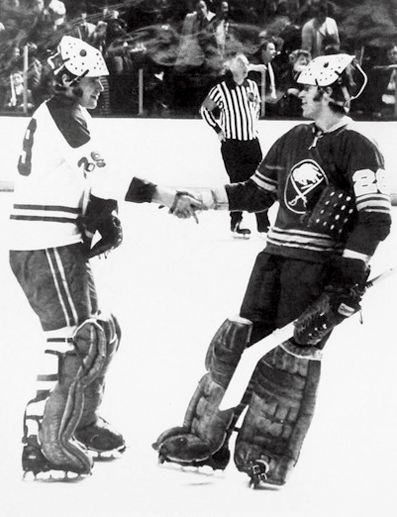



Dave, six years older than Ken, actually made his NHL debut with a single appearance back in February of 1962 season for the New York Rangers. Since NHL teams did not dress backup goaltenders at the time, Dave was actually sitting in the stands when Rangers starter Gump Worsley needed to be replaced after the first period. It would take him several years to see action in the NHL again, this time with the Chicago Black Hawks, where he would play parts of three seasons until establishing himself as an NHL regular with the expansion Sabres in 1970-71.
Dave would play four seasons with Buffalo before jumping to the World Hockey Association, first with the Chicago Cougars, of whom he was a part owner, before finding a home with the Edmonton Oilers for the final four seasons of the WHA and one back in the NHL.
Ken, always one to march to the beat of his own drummer, was originally drafted in 1964, but chose to instead pursue a college degree while continuing to play hockey at Cornell, where he would win an NCAA championship in 1967. After playing for the Canadian National Team in 1969-70, he would play the vast majority of the 1970-71 season with the Montreal Voyageurs of the American Hockey League while pursing his law degree at McGill University before being called up to finally make his NHL debut with the Montreal Canadiens, seven years after being drafted, in time for the final six games of the season.
Ken Dryden's NHL debut came on March 14, 1971 in a 5-1 win against the Pittsburgh Penguins and it was four days later on this date in 1971 that Ken's Canadiens squared off against Dave's Sabres, becoming the first and only pair of brothers to oppose each other in goal during an NHL game.
Although it wasn't supposed to happen.
The Sabres general manager Punch Imlach, who understood the publicity the brother versus brother would bring and how it would simply be fun to be a part of, planned all along to start Dave in goal for the Sabres, but Canadiens coach Al MacNeil had already picked Rogie Vachon to start against Buffalo rather than the untested rookie Ken.
Imlach, being the visiting team, was required to submit his lineup first and stuck to his guns with Dave, but so did MacNeil, who went with Vachon. With that, Imlach decided to immediately replace Dave in the Sabres goal once the game got underway, and once the first whistle blew, Joe Daley came on for the Sabres.
Fate intervened however, when a few minutes into the second period Vachon was felled by an injury, which pressed Ken into service. "As soon as Ken went in, Punch said "In you go, too," Dave said. "To him, the score would have meant nothing, it was just the fact that he had set out to have both of us play against each other."
The final score of the game was 5-2 in favor of the Canadiens, who were on their way to a Stanley Cup championship, over the first year expansion Sabres. When the game ended, the two brothers skated to center ice and shook hands, something normally reserved for playoff games.
"We knew, I think, that no brothers had played against each other, but the crowd didn't know it at all," said Dave.
"It's interesting, we have a picture of Ken and I at the end of the game shaking hand and you can see the crowd in the background, and obviously the crowd wasn't watching. There isn't anyone's face looking at us."

"The best part was here was our Dad, who took a chance and came down, and he saw it," said Ken about his father, whom he had told in advance that he was not going to be starting the game.
Following that first game, they ended up playing each other about four or five times over the course of their careers during the two additional seasons their NHL careers overlapped, and they had agreed that they would always shake hands at center ice after the game. We don't believe the photo above is from their first encounter, as Ken would have been wearing his "pretzel" mask on the occasion of his nhl debut, but it is an early enough photo that his mask has yet to acquire his iconic concentric "C" design that many interpreted as a bullseye target.
"I was so distracted knowing he was at the other end," Ken said. "I didn't enjoy those games against Buffalo."
Even though Ken only appeared in six regular season games for Montreal, he won all of them, only giving up nine goals, which lead to him quickly taking over the starting job for the Canadiens in the playoffs. Miraculously, he started all 20 of Montreal's playoff games, leading them to the Stanley Cup and being named the winner of the Conn Smythe Trophy. Oddly, since he did not play enough regular season games, Ken entered the following season with his rookie status still intact and would go on to be named the winner of the Calder Trophy as the NHL's rookie of the year, having already been named the MVP of the playoffs the prior season, a feat no one else in league history has ever accomplished.
Dave Dryden would also be credited with an influential accomplishment of his own, as he was the innovator of the modern goalie mask, which combined the protection of a fiberglass mask with the vision of a cage mask for the first time ever.

Dave is also the answer to a trivia question, having surrendered the first professional goal scored by Wayne Gretzky.
Today's featured jersey is a 1972-73 Montreal Canadiens Ken Dryden jersey from a season in which the Canadiens would capture another Stanley Cup championship.
This style jersey dates back to 1941 and, aside from a version with a blue stripe around the chest for three years in the late 40's, has remained essentially unchanged ever since.


Here is a profile of Dave Dryden's career on the occasion of his being inducted into the Etobicoke Sports Hall of Fame.
Next we have footage of Gretzky's first professional goal, scored against Dave Dryden.
Here's a fun one, home movies originally shot on Super 8 of Dave Dryden playing goal for the Sabres against the Minnesota North Stars in 1974.
In an attempt to give some equal time, we close out today with a look back at the career of Ken Dryden, hosted by former goaltender John Davidson.
Labels:
Dryden Dave,
Dryden Ken,
Montreal Canadiens
Wednesday, March 19, 2014
2014 KHL Gagarin Cup Playoff Update
The opening round of the Kontinental Hockey League Gagarin Cup playoffs concluded yesterday with a Game 7 thriller to set the pairings for the Conference Semifinals.
In the Western Conference, the Tarasov Division, defending KHL champions Dynamo Moscow finished the regular season with the best overall record in the KHL's 54 game season with a, ...ready for this… , 34-2-2-5-0-11 record. That would be 34 wins, 2 overtime wins, 2 shootout wins, 5 shootout losses, 0 overtime losses and 11 regulation losses! It all added up to 115 points and the #1 seed in the West. #2 was SKA Saint Petersburg with 105 points.
Dynamo was paired with the #8 team, Lokomotiv Yaroslavl, who dominated at home after the first five games of the series were all decided by one goal, including three in overtime, with a 6-0 win to force a Game 7 back in Moscow where Lokomotiv got two goals a minute and a half apart to take a 2-0 lead into the second period. Dynamo got one back in the second to send the game into the third period with Lokomotiv up 2-1 and it still anyone's series, but Yaroslavl came out of the gate flying, extending their lead to 3-1 less than a minute into the third on a goal by Sergei Konkov to put the champions on the ropes.
The knockout blow was delivered on a power play, again by Konkov, his second of the period, to give Yaroslavl a 4-1 lead. A last goal with 48 second remaining made the final margin 5-1 and capping off an emotional upset for the ages, just two years removed from the tragedy that wiped out the entire Lokomotiv team and forced the club to start over from scratch just one season ago.
Meanwhile, #2 SKA Saint Petersburg, led by captain Ilya Kovalchuk, swept #7 CSKA Moscow in four straight while #3 Lev Prague of the Czech Republic also swept #6, the Croatian club Medvescak Zagreb 4 games to none.
In the final western pairing, #4 Donbass Donetsk from Ukraine had a tough fight on their hands in the form of the #5 Latvian club Dinamo Riga, who also stayed alive with a Game 6 win at home to force a Game 7. Donbass then prevailed with a 3-1 win to move onto the next round in a game moved to Bratislava, Slovakia due to the political situation in Ukraine at the present.
Over in the Eastern Conference, Metallurg Magnitogorsk, led by first year head coach Canadian Mike Keenan, snared the #1 seed with 108 points, led by Sergei Mozyakin (73 points), Jan Kovar (68) and Danis Zaripov (64), who finished 1-2-3 in the KHL scoring race. They faced the first year expansion club and #8 seed Admiral Vladivostok from far, far eastern Russia next to North Korea on the Sea of Japan, 4,700 miles away from Magnitogorsk, an 8 hour flight. While favored Magnitogorsk moved on, it required three overtime games before they prevailed 4-1.
#2 Barys Astana of Kazakhstan swept #7 Avtomobilist Yekaterinburg, with the first two games in Astana requiring overtime.
#3 Ak Bars Kazan squared off against #6 Sibir Novosibirsk in a tough series where the tone was set early when Sibir won Game 1 on the road in Kazan 3-1. Kazan fought back to win Game 2, but required overtime to do so. The teams traded lopsided victories in Novosibirsk in Games 3 & 4 before Sibir won a close 1-0 win in Game 5 and closed out Ak Bars in overtime at home to lower seed to advance with their win on Sunday the 16th.
#4 Savalat Yulaev Ufa battled #5 Torpedo Nizhny Novgorod in an odd series, as the road team won the first four games of the series. Order was restored as Salavat won Game 5 at home only to have Torpedo return the favor in Game 6, forcing a deciding Game 7 which went the way of Salavat in a tense 2-1 game, giving them the series victory, with the highlights below.
Additionally, here are highlights with English commentary of the two Game 7's from March 17th, with Lokomotiv defeating Dynamo Moscow followed by Donbass ousting Dinamo Riga in their winner take all match up.
The pairings for the Conference Semifinals are now all set, with #1 Metallurg Magnitogorsk facing #6 Sibir Novosibrisk and well-rested #2 Barys Astana meeting Savalat Yulaev Ufa, who just completed a full seven game series, in the East.
In the Western Conference, #2 SKA Saint Petersburg (also have had plenty of time off following their first round sweep) meets upset minded #8 Lokomotiv Yaroslavl for the right to meet the winner of #3 Lev Prague vs. #4 Donbass Donestsk in the third series where the winner of a first round sweep meets and underdog who just slogged through a full seven games. Will the favorites suffer from having too much time off? Will the underdogs be on a roll, or have they spent too much energy too soon to be able to battle a rested favorite?
If you would like to purchase a Kovalchuk SKA Saint Petersburgh, or any other KHL jersey of your very own, please click the logo below to get in touch with our sponsors ProRussianJerseys.com!
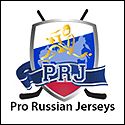
Dynamo was paired with the #8 team, Lokomotiv Yaroslavl, who dominated at home after the first five games of the series were all decided by one goal, including three in overtime, with a 6-0 win to force a Game 7 back in Moscow where Lokomotiv got two goals a minute and a half apart to take a 2-0 lead into the second period. Dynamo got one back in the second to send the game into the third period with Lokomotiv up 2-1 and it still anyone's series, but Yaroslavl came out of the gate flying, extending their lead to 3-1 less than a minute into the third on a goal by Sergei Konkov to put the champions on the ropes.
The knockout blow was delivered on a power play, again by Konkov, his second of the period, to give Yaroslavl a 4-1 lead. A last goal with 48 second remaining made the final margin 5-1 and capping off an emotional upset for the ages, just two years removed from the tragedy that wiped out the entire Lokomotiv team and forced the club to start over from scratch just one season ago.
Meanwhile, #2 SKA Saint Petersburg, led by captain Ilya Kovalchuk, swept #7 CSKA Moscow in four straight while #3 Lev Prague of the Czech Republic also swept #6, the Croatian club Medvescak Zagreb 4 games to none.
In the final western pairing, #4 Donbass Donetsk from Ukraine had a tough fight on their hands in the form of the #5 Latvian club Dinamo Riga, who also stayed alive with a Game 6 win at home to force a Game 7. Donbass then prevailed with a 3-1 win to move onto the next round in a game moved to Bratislava, Slovakia due to the political situation in Ukraine at the present.
Over in the Eastern Conference, Metallurg Magnitogorsk, led by first year head coach Canadian Mike Keenan, snared the #1 seed with 108 points, led by Sergei Mozyakin (73 points), Jan Kovar (68) and Danis Zaripov (64), who finished 1-2-3 in the KHL scoring race. They faced the first year expansion club and #8 seed Admiral Vladivostok from far, far eastern Russia next to North Korea on the Sea of Japan, 4,700 miles away from Magnitogorsk, an 8 hour flight. While favored Magnitogorsk moved on, it required three overtime games before they prevailed 4-1.
#2 Barys Astana of Kazakhstan swept #7 Avtomobilist Yekaterinburg, with the first two games in Astana requiring overtime.
#3 Ak Bars Kazan squared off against #6 Sibir Novosibirsk in a tough series where the tone was set early when Sibir won Game 1 on the road in Kazan 3-1. Kazan fought back to win Game 2, but required overtime to do so. The teams traded lopsided victories in Novosibirsk in Games 3 & 4 before Sibir won a close 1-0 win in Game 5 and closed out Ak Bars in overtime at home to lower seed to advance with their win on Sunday the 16th.
#4 Savalat Yulaev Ufa battled #5 Torpedo Nizhny Novgorod in an odd series, as the road team won the first four games of the series. Order was restored as Salavat won Game 5 at home only to have Torpedo return the favor in Game 6, forcing a deciding Game 7 which went the way of Salavat in a tense 2-1 game, giving them the series victory, with the highlights below.
The pairings for the Conference Semifinals are now all set, with #1 Metallurg Magnitogorsk facing #6 Sibir Novosibrisk and well-rested #2 Barys Astana meeting Savalat Yulaev Ufa, who just completed a full seven game series, in the East.
In the Western Conference, #2 SKA Saint Petersburg (also have had plenty of time off following their first round sweep) meets upset minded #8 Lokomotiv Yaroslavl for the right to meet the winner of #3 Lev Prague vs. #4 Donbass Donestsk in the third series where the winner of a first round sweep meets and underdog who just slogged through a full seven games. Will the favorites suffer from having too much time off? Will the underdogs be on a roll, or have they spent too much energy too soon to be able to battle a rested favorite?
If you would like to purchase a Kovalchuk SKA Saint Petersburgh, or any other KHL jersey of your very own, please click the logo below to get in touch with our sponsors ProRussianJerseys.com!

Labels:
Gagarin Cup,
KHL
Monday, March 17, 2014
1934-35 Montreal Maroons Cy Wentworth Jersey
The Montreal Wanderers hockey club was founded in 1903 and competed during hockey's formative years. They were the darlings of the English speaking population of Montreal and won their first Stanley Cup in March of 1906. Over the next three years the Wanderers won six Stanley Cup challenges and were the first National Hockey Association champions in 1910, which once again made them the holders of the Stanley Cup.
They subsequently defended the cup one final time before falling on hard times, making the playoffs once in the next eight seasons. In 1917-18 they became a charter member of the new National Hockey League, but when the Montreal Arena burned to the ground only six games into the first NHL season. the club folded for good.
The Montreal Arena Fire aftermath
Meanwhile, another club had been formed in Montreal back in 1909 as a charter member of the NHA in order to give the French speaking population of Montreal a team to call their own. The team, stocked with French-Canadian players, the Montreal Canadiens, took some time to develop into a contender and did not win their first Stanley Cup until 1916. They too, would join the NHL in 1917, but would not win another Stanley Cup until 1924, by now the only game in town following the demise of the Wanderers in 1918.
That would all change later in the calendar year, when a new expansion club would be formed, the Montreal Maroons, which would begin as intense a rivalry that the league as ever seen, as the Maroons were formed to specifically appeal to the English speaking fans of Montreal. While the Canadiens played at the Mount Royal Arena, a new home was constructed for the Maroons, the Montreal Forum. While the Canadiens objected to a second team being placed in Montreal, they were compensated by expansion fees and the Maroons came to be.
When they began life, the Montreal Professional Hockey Club had no nickname. Their original president, James Strachan, had been an owner of the Wanderers and attempted to revive the name, but the media eventually began calling the club the Maroons after the color of the team's sweaters.
The two clubs rivalry would begin prior to even the Maroons first game having been played, as the Canadiens would usurp the Maroons by playing the first game ever at the Maroons shiny, new arena, as the Canadiens home rink's natural ice surface was not yet playable so early in the season. Subsequently, the Canadiens game on November 29th, 1924 was relocated to the Forum by the NHL despite objections from both the Forum and the Maroons.
The Canadiens and the Maroons would first meet on December 10, 1924 in a rivalry that would last 14 years. In that game, hosted by the defending Stanley Cup champion Canadiens at the Mount Royal Arena in from of 5,000 fans, was won by the francophones 5-0 over the anglophones behind by Aurel Joliat's four goals and goaltender Georges Vezina's ninth career shutout, both of whom were future Hall of Famers.
Aurel Joliat
The next meeting between the two clubs would come on December 27th at the Forum with 11,000 on hand, ending in a 1-1 draw, as would their next meeting on January 17th. The Canadiens would eventually dominate the season series with shutouts on January 31st, again by a score of 5-0, and on February 18th by a score of 1-0. The Maroons would drop the sixth game of the season series 3-1 on March 7th to finish the season at 0-4-2 versus their crosstown rivals in a series of games described at "mini-wars on ice" - and in the stands among the supporters!
For their first season, the Maroons wore simple maroon sweaters with a small block "Montreal" across the chest.
Clint Benedict
The Maroons would turn the tables in short order, as they would defeat the Club de hockey Canadien for the first time ever on December 3rd, 1925 in the Canadiens opening game of the 1925-26 season by a score of 3-2. Nels Stewart scored the first and third goals for the Maroons, both at 15:40 of the first and third periods. Punch Broadbent would register the other Maroons goal, while the great Howie Morenz opened the scoring for the Canadiens and Billy Boucher evened the score at 2-2 midway through the third period before Stewart's game winner.
Stewart would go on to win the Hart Trophy as the league MVP after leading the league in scoring with 42 points as the club would qualify for the playoffs following a second place finish. After defeating both the Pittsburgh Pirates and Ottawa Senators to win the NHL playoffs, the Maroons would put themselves on the map with a 3 games to 1 defeat of the Victoria Cougars to capture the Stanley Cup in only their second season of play, which would see the arrival of the large block "M" logo that would adorn their sweaters for the remainder of their time in the NHL.
1926 Hart Trophy winner Nels Stewart
The rivalry between the two clubs would reach a new level in 1926-27, as the Canadiens would become permanent tenants of the Forum. The rivalry would be ratcheted up even further as the pair would meet in the playoffs for the first time, won by the Canadiens in a two-game, total-goals series. Game 1 was a 1-1 draw, and the Canadiens prevailed with a goal by Morenz at 12:05 of overtime to give them a final 2 goals to 1 margin. Clint Benedict of the Maroons would lead all goaltenders that season with a 1.42 goals against average yet the Canadiens George Hainsworth would win the Vezina Trophy while Herb Gardiner of the Canadiens would win the Hart Trophy.
1927 Hart Trophy winner Herb Gardiner
The teams would finish 1-2 in the Canadian Division in 1927-28 and face each other again in the playoffs when the Maroons advance to the semifinals after defeating Ottawa. In a mirror image of their first meeting, the opening game was a 2-2 tie followed by a 1-0 win, this time for the Maroons, at 8:20 of overtime on a goal by Russell Oatman. The Maroons would eventually fall in the fifth and final game of the cup finals. The Canadiens Morenz would win the Hart Trophy that season.
1928 Hart Trophy winner Howie Morenz
Hainsworth would win a well-earned Vezina Trophy for the Canadiens in 1928-29 thanks to a staggering 22 shutouts in 44 games.
The Maroons took the Canadian Division on a tie breaker in 1929-30, having won 23 games versus the Canadiens 21, as both teams tied with 51 points. They did not meet in the playoffs, as the Canadiens went on to win the Stanley Cup following an undefeated playoff run. Meanwhile, the Maroons' Stewart would win his second Hart Trophy that season.
The 1930 Stanley Cup champion Montreal Canadiens
Both teams again qualified for the playoffs in 1930-31 after the Canadiens won the division while the Maroons came third. The Maroons were blown out by the Rangers in Round 1 8 goals to 1. Meanwhile the Canadiens ousted the American Division champion Boston Bruins 3 goals to 2 and then won their second consecutive Stanley Cup by defeating the Chicago Black Hawks 3 games to 2, with every goal being decided by a goal and two games going to overtime, one double overtime and the other triple overtime, in likely the closest Stanley Cup Final series ever. The Canadiens' Morenz won the league scoring race with 49 points, 17 clear of second place, to win another Hart Trophy, which he would capture once again in 1931-32.
The 1931 Stanley Cup champion Montreal Canadiens
The 1932-33 season saw Baldy Northcott, Hooley Smith and Paul Haynes of the Maroons finish 3-4-5 in league scoring.
Russ Blinco was the NHL Rookie of the Year in 1933-34 for the Maroons while Joliat took home the Hart Trophy for the Canadiens.
The 1934-35 season would see the Maroons edge the Chicago Black Hawks after a 0-0 tie in Game 1 and an overtime winner in a 1-0 total goals series. After defeating the Rangers 2-1 and advancing after a 3-3 draw, the Maroons swept the Toronto Maple Leafs in their best of three final series to capture their second Stanley Cup after their undefeated playoff run (5-0-2).
The 1935 Stanley Cup champion Montreal Maroons
With the Great Depression in full effect, both Montreal clubs were having great difficulty drawing fans, with the Maroons particularly hurt due to the smaller anglophone fanbase in Montreal. The rest of the league was also suffering great difficulties, as the league shrank from 10 clubs in 1931 to 8 in 1935. Still, the Maroons would go on to win the Canadian Division once again in 1935-36. Later during that season's playoffs, the Maroons would battle the Detroit Red Wings in what remains the longest game in NHL history, a 6 overtime loss on March 24, 1936.
The Canadiens would edge the Maroons for the division title in 1936-37 by a single point, as the financially struggling Maroons began to sell of their better players, with team captain and franchise all-time leading scorer Smith departing for Boston. In contrast, the Canadiens' Babe Siebert was the Hart Trophy winner for the season.
1927 Hart Trophy winner Babe Siebert
The Maroons final season would come in 1937-38, but before it would begin, the two rival clubs would come together like never before. Following the premature death of the Canadiens' Morenz, the second all-star game in league history would be held as a benefit for the Morenz family, in which a team made up of both Canadiens and Maroons would face an all-star squad made up of members of the rest of the league's clubs. The All-Stars would win the game by a score of 6-5.
The Maroons and Canadiens team photo
from the 1937 Howie Morenz Benefit Game
The Maroons endured a coaching change on their way to a last place finish in the league with a 12-30-6 record. After suffering with the lowest attendance in the league for three seasons in a row, the final Maroons game was played against the Canadiens on this date in 1938, a 6-3 win for the Canadiens.
The series between the two clubs featured intense battles both on the ice, as well as between the rival groups of supporters. While both teams would win a pair of Stanley Cups during the Maroon's 14 year history, the series would eventually end in favor of the Canadiens at 40-35-17, with the Canadiens posting 18 shutouts against the rival Maroons.
The series between the two clubs featured intense battles both on the ice, as well as between the rival groups of supporters. While both teams would win a pair of Stanley Cups during the Maroon's 14 year history, the series would eventually end in favor of the Canadiens at 40-35-17, with the Canadiens posting 18 shutouts against the rival Maroons.
The Maroons hold the distinction of being the last Canadian club added to the NHL until 1970 with the arrival of the Vancouver Canucks. They are also the last team to have won the Stanley Cup and then later ceased operations and also the last non-Original 6 team to win the Stanley Cup until the 1974 Philadelphia Flyers.
Following the demise of the Maroons, the anglophones of Montreal were left with two options, become fans of the local Canadiens, or switch their allegiance to the Toronto Maple Leafs, who hailed from English Canada.
Today's featured jersey is a 1934-35 Montreal Maroons Cy Wentworth jersey from the Maroons second Stanley Cup winning season.
The Maroons sweaters underwent several changes in their 14 years. Their first season sweaters had the the name "Montreal" across the chest in simple block letters. They replaced that with the large "M" crest for year two, in which they won the Stanley Cup. Those sweaters featured four white stripes around the the arms and two on the waist.
The Maroons sweaters underwent several changes in their 14 years. Their first season sweaters had the the name "Montreal" across the chest in simple block letters. They replaced that with the large "M" crest for year two, in which they won the Stanley Cup. Those sweaters featured four white stripes around the the arms and two on the waist.
In 1929 styles had changed and the Maroons now had nine thinner stripes going around the arms and the waist stripes were increased to three in keeping with the influences of the Art Deco look. After two seasons they switched to the "Northwestern" stripe pattern (a thick center stripe flanked by two thinner stripes) for the rest of their time in the NHL, with the only remaining change being to the font used for the "M" in 1935.
During the Maroons time in the NHL, teams almost exclusively wore one style of sweater unless they were facing another team wearing a similarly colored sweater. During the Maroons final season of 1937-38, only four of the NHL's then eight teams wore a white "road" sweater to avoid color similarities, such as blue-clad Maple Leafs facing the New York Rangers or the Detroit Red Wings playing the Canadiens, so the Maroons never needed a white version of their unique maroon sweaters.
During the Maroons time in the NHL, teams almost exclusively wore one style of sweater unless they were facing another team wearing a similarly colored sweater. During the Maroons final season of 1937-38, only four of the NHL's then eight teams wore a white "road" sweater to avoid color similarities, such as blue-clad Maple Leafs facing the New York Rangers or the Detroit Red Wings playing the Canadiens, so the Maroons never needed a white version of their unique maroon sweaters.
Labels:
Montreal Canadiens,
Montreal Maroons
Subscribe to:
Comments (Atom)

